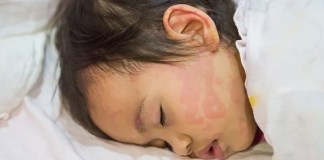18 August 2025
The World Health Organization today announced Nepal has eliminated rubella as a public health problem, a remarkable achievement for a country making concerted efforts to protect its people from vaccine preventable diseases.
Rubella, or German measles, is a highly contagious viral infection. It is particularly serious for pregnant women as infection can lead to miscarriage, stillbirth, or a range of lifelong and debilitating birth defects. But rubella is preventable with safe and cost-effective vaccines.
“Nepal’s success reflects the unwavering commitment of its leadership, persistent efforts of the health care workers and volunteers, and unstinting support of engaged and informed communities, for a healthy start for babies and a future free of rubella disease,” said Dr Catharina Boehme, Officer-In-Charge WHO South-East Asia, while endorsing the recommendation of the Regional Verification Commission for Measles and Rubella elimination in South-East Asia Region (SEA-RVC) for Nepal to be verified for eliminating rubella.
The SEA-RVC which held its annual meeting from 22-24 July 2025, reviewed and evaluated information and data submitted by the national verification committee on measles and rubella disease surveillance and immunization coverage rates, and recommended verification of rubella elimination in Nepal.
Nepal is the sixth country in WHO South-East Asia to achieve rubella elimination. Prioritizing elimination of measles and rubella as public health problems in WHO South-East Asia by 2026, Bhutan, DPR Korea, Maldives, and Timor-Leste have eliminated measles, and Bhutan, DPR Korea, Maldives, Sri Lanka, Timor-Leste, and now Nepal, have eliminated rubella.
“Nepal’s achievement of rubella elimination is yet another testament to the success of the national immunization program ahead of the regional target, which has long been one of the strongest pillars of our health care system. Gavi and WHO’s steadfast support to the programme and the overall health sector in Nepal is deeply valued and acknowledged. I take this moment to thank and congratulate all the leaders, health workers, volunteers and community members who’ve contributed to this achievement. And I call upon all stakeholders to continue their unwavering support so that no child in Nepal has to suffer from a vaccine-preventable disease,” said Mr Pradip Paudel, Minister of Health and Population, Nepal.
Nepal introduced rubella-containing vaccine in its immunization programme in 2012 with a nationwide campaign for age group 9 months to 15 years. A second dose of rubella-containing vaccine was added to the routine immunization schedule in 2016.
Four national campaigns with rubella vaccines in 2012, 2016, 2020, and 2024, helped increase access, despite major public health emergencies such as the COVID-19 pandemic and earthquakes in 2015 and 2023. By 2024, Nepal achieved over 95% coverage for at least one dose of rubella vaccine.
Innovative strategies such as observing ‘immunization month’, outreach to vaccinate missed children, and motivation for the districts to be declared ‘fully immunized’, provided further impetus to elimination efforts.
To further strengthen surveillance, Nepal recently introduced a robust laboratory testing algorithm, the first in the WHO South-East Asia Region to do so.
“Congratulations to Nepal for eliminating rubella. This public health achievement is the result of close collaboration between the government, dedicated health workers, partners and communities. WHO is proud to have contributed to this journey and remains committed to supporting Nepal sustain this accomplishment,” said Dr Rajesh Sambhajirao Pandav, WHO Representative to Nepal.
Verification process
The Regional Verification Commission for Measles and Rubella elimination in South-East Asia Region (SEA-RVC) was established in March 2016 to monitor progress towards measles and rubella elimination.
National Verification Committees of countries in WHO South-East Asia Region report on annual progress made towards achieving the goal of measles and rubella elimination which is then reviewed by SEA-RVC which provides suggestions and recommendations or verify them as achieved the status of measles and rubella elimination.
In 2013, the WHO South-East Asia Region set the goal to eliminate measles and control rubella by 2020. In 2019 the goal was revised to measles and rubella elimination by 2023. In view of setback during COVID-19 pandemic, in 2024 Member countries agreed to extend the target for elimination of measles and rubella, aspiring to achieve by 2026.
WHO SEARO News release, New Delhi
Related
Great Job Public Health Update & the Team @ Public Health Update Source link for sharing this story.




